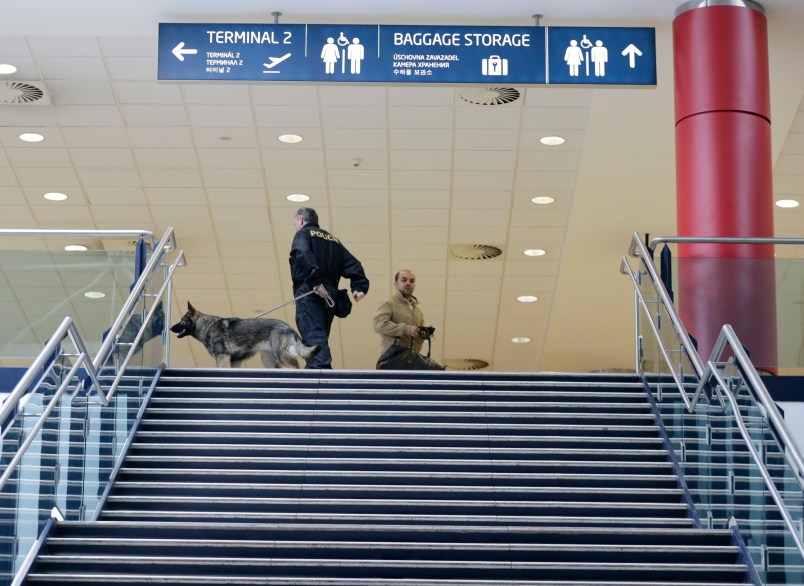MOSCOW (AP) — Authorities in Europe and beyond tightened security at airports, on subways, at the borders and on city streets after deadly attacks Tuesday on the Brussels airport and its subway system.
With Brussels on lockdown and the French prime minister saying that Europe is “at war,” European leaders held emergency security meetings and deployed more police, explosives experts, sniffer dogs and plainclothes officers at key points across the continent.
After a string of extremist attacks targeting the heart of Europe over the past year, some analysts say Europe will finally have to implement a much tougher level of security at airports, but also at so-called “soft targets” like shopping malls — the kind that Israelis have been living with for years.
“The threat we are facing in Europe is about the same as what Israel faces,” said Olivier Guitta, the managing director of GlobalStrat, an international security consultancy. “We have entered an era in which we are going to have to change our way of life and take security very seriously.”
Strong criticism of Belgian security came on Tuesday from Pini Schiff, a former security director at Israel’s Ben-Gurion Airport, which is considered among the most secure in the world. After Palestinian attacks on Israeli planes and travelers in the 1970s, Israeli officials put in place several layers of security at that airport in Tel Aviv, meaning an attacker who escapes notices at one level of security would likely be captured by another.
Schiff said the attacks at the Brussels airport mark “a colossal failure” of Belgian security and that “the chances are very low” such a bombing could have happened in Israel.
There are some, however, who fear that little more can realistically be done.
“The public needs to understand that if we are to continue enjoy living in a free society we have to respond in a proportional way,” said Simon Bennett, director of the Civil Safety and Security Unit at the University of Leicester, England. “In my opinion, airport security is as tight as we can reasonably make it in a free society.”
In Moscow, Russian Transport Minister Maxim Sokolov told Russian news agencies that authorities will “re-evaluate security” at Russian airports, although its measures are already among some of the toughest across Europe. There have been mandatory checks at the entrances to airports since a 2011 suicide bombing at Moscow’s Domodedovo airport that killed 37.
The Paris airport authority said security was tightened at all Paris airports soon after the Brusselsexplosions on Tuesday morning. Airports in London, Prague, Amsterdam, Vienna, and many others, also saw increased security.
Both of London’s major airports, Gatwick and Heathrow, stepped up security.
In Germany, the state rail system, Deutsche Bahn, halted its high-speed rail service from Germany toBrussels. The company said its ICE trains are now stopping at the border city of Aachen.
Egypt also said it was increasing security, with top security officials asked to personally handle security checks inside airports and in outside areas like hotels and car parks.
Egypt has been working to improve its security after a Russian jet was brought down last October by extremists after taking off from Sharm el-Sheikh International Airport, killing all 224 people on board. Moscow said it was brought down by an explosive device, and a local branch of the extremist Islamic State group has claimed responsibility for planting it.
The British, Dutch and Polish governments convened emergency meetings as they beefed up security at airports.
In Greece, police added additional security at airports, metro stations and embassies with uniformed and plain-clothed officers.
But Greece’s government spokeswoman Olga Gerovasili said there were no additional security measures being taken for refugees and migrants following the Brussels attacks.
“We are not making any linkage between those two issues. That would be a defeat for Europe,” she said.
___
Associated Press writers Jill Lawless and Danica Kirka in London, Daniella Cheslaw in Jerusalem, Frank Jordans in Berlin, Nataliya Vasilyeva and Katherine Jacobsen in Moscow, Ciaran Giles in Madrid, Alison Mutler in Bucharest, Monika Scislowska in Warsaw, Karel Janicek in Prague, George Jahn in Vienna and Derek Gatopoulos in Athens contributed to this report.
Copyright 2016 The Associated Press. All rights reserved. This material may not be published, broadcast, rewritten or redistributed.






